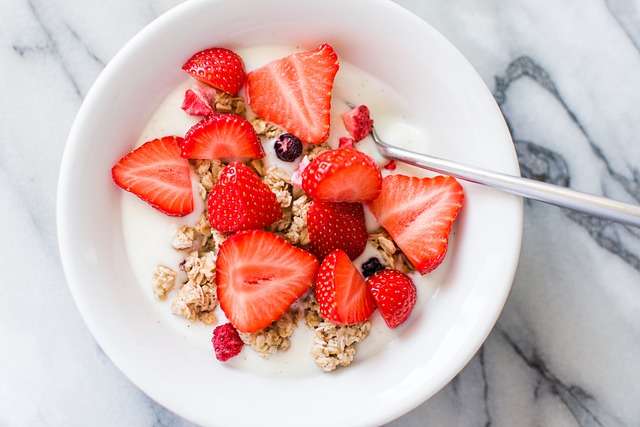Are you looking to lose weight but struggling to see results? One of the simplest yet most effective changes you can make to your diet is to start eating breakfast. Despite its reputation as the “most important meal of the day,” breakfast is often skipped or replaced with a quick coffee or snack. However, research has consistently shown that eating a healthy breakfast can have a significant impact on weight loss. In this blog post, we’ll explore the reasons why eating breakfast is important for weight loss, including its effects on metabolism, hunger control, and nutrient intake. We’ll also provide tips for creating a balanced breakfast that will help you achieve your weight loss goals. So grab a cup of coffee and let’s dive into the benefits of starting your day with a healthy breakfast.
Metabolism and Breakfast

Metabolism is the process by which the body converts food into energy. It involves a complex series of chemical reactions that take place in the cells of the body, and it is responsible for maintaining basic bodily functions like breathing, circulation, and digestion.
When we wake up in the morning, our metabolism is typically at its lowest point. This is because our bodies have been in a state of rest and repair during sleep, and our energy stores are depleted. Eating breakfast provides the body with the fuel it needs to jumpstart the metabolism and begin the process of converting food into energy.
Breakfast Has a Significant Impact on Metabolism
Research has consistently shown that eating breakfast can have a significant impact on metabolism. A study we found in the National Library of Medicine found that people who skipped breakfast had a lower resting metabolic rate than those who ate breakfast. This means that their bodies were burning fewer calories at rest, which can lead to weight gain over time.
Another study published in the Journal of Physiology found that skipping breakfast can also lead to an increase in insulin resistance, a condition in which the body’s cells become less responsive to the hormone insulin. This can lead to a buildup of glucose in the bloodstream, which can contribute to weight gain and other health problems.
On the other hand, eating a healthy breakfast has been shown to boost metabolism and help the body burn calories more efficiently throughout the day. A study published in the International Journal of Obesity found that people who ate a high-protein breakfast burned more calories throughout the day than those who ate a high-carbohydrate breakfast or skipped breakfast altogether.
Overall, the research suggests that eating breakfast is an important strategy for boosting metabolism and promoting weight loss. By providing the body with the fuel it needs to start the day, breakfast can help kick start the metabolism and promote healthy calorie burning throughout the day.
Breakfast and Hunger Control

Hunger and satiety are complex processes that involve a range of hormones and signals in the body. When we eat, our bodies release hormones like ghrelin, which signals hunger, and leptin, which signals fullness or satiety. These hormones play an important role in regulating our appetite and helping us maintain a healthy weight.
Eating breakfast can help control hunger throughout the day by regulating these hormones and promoting feelings of fullness. When we skip breakfast or go for long periods without eating, our bodies can go into a state of “starvation mode,” which can trigger overeating and cravings for high-calorie foods.
Research has consistently shown that eating breakfast can help control hunger throughout the day. A study published in the Journal of Nutrition found that people who ate a high-protein breakfast reported feeling fuller and more satisfied throughout the day than those who ate a high-carbohydrate breakfast or skipped breakfast altogether. Another study published in the American Journal of Clinical Nutrition found that people who ate a high-fibre breakfast reported lower levels of hunger and greater feelings of fullness than those who ate a low-fibre breakfast.
In addition to regulating hormones and promoting feelings of fullness, eating breakfast can also help stabilise blood sugar levels and prevent spikes and crashes in energy levels. This can help prevent overeating and cravings for high-calorie foods, which can contribute to weight gain over time.
Overall, the research suggests that eating breakfast is an important strategy for controlling hunger throughout the day and promoting healthy eating habits. By providing the body with a balanced and nutritious meal in the morning, breakfast can help regulate hormones, promote feelings of fullness, and prevent overeating and cravings for high-calorie foods.
Nutritional Benefits of Breakfast

Breakfast is an important meal that provides the body with the essential nutrients needed to maintain health and energy throughout the day. A balanced breakfast should include a combination of carbohydrates, protein, and healthy fats, as well as essential vitamins and minerals.
Here are some essential nutrients found in common breakfast foods:
Carbohydrates:
- Whole grain bread or cereal provide fibre, which can help regulate digestion and promote feelings of fullness.
- Fruits and vegetables provide essential vitamins and minerals, as well as fibre.
Protein:
- Eggs, yoghurt, and nut butter provide high-quality protein, which can help regulate blood sugar levels and promote feelings of fullness.
- Lean meats like turkey or chicken can provide a good source of protein, as well as other essential nutrients like iron and zinc.
Healthy fats:
- Avocado, nuts, and seeds provide healthy fats, which can help regulate cholesterol levels and promote heart health.
Studies have shown that breakfast eaters tend to have higher nutrient intakes compared to those who skip breakfast. A study published in the Journal of the American Dietetic Association found that breakfast eaters had higher intakes of vitamins and minerals like calcium, iron, and vitamin C, compared to non-breakfast eaters. The study also found that breakfast eaters tended to have healthier overall diets, with a greater intake of fruits, vegetables, and whole grains.
In addition to providing essential nutrients, eating a healthy breakfast can also help prevent overeating and cravings for unhealthy foods later in the day. A study published in the International Journal of Obesity found that people who ate a high-protein breakfast reported fewer cravings for high-fat and sugary foods later in the day than those who ate a high-carbohydrate breakfast.
Overall, the research suggests that eating a balanced breakfast is an important strategy for maintaining health and promoting healthy eating habits. By providing the body with essential nutrients and promoting feelings of fullness, breakfast can help prevent overeating and support a healthy weight.
Importance of a Balanced Breakfast

A balanced breakfast is a meal that includes a combination of macronutrients (carbohydrates, protein, and fat) and micronutrients (vitamins and minerals) that provide the body with the energy and nutrients it needs to start the day. Eating a balanced breakfast can help regulate blood sugar levels, provide sustained energy throughout the morning, and promote feelings of fullness, which can lead to better food choices throughout the day.
Protein is an essential nutrient that plays a key role in regulating appetite and promoting feelings of fullness. Eating protein-rich foods like eggs, Greek yoghurt, or nut butter at breakfast can help control hunger and prevent overeating later in the day. Protein also helps build and repair muscle tissue, which is especially important for people who engage in regular physical activity.
Whole-Grain Bread, Oatmeal, and Fruits
Fibre is another important nutrient that can help regulate digestion and promote feelings of fullness. Foods like whole-grain bread, oatmeal, and fruits and vegetables are high in fibre and can help keep you feeling full and satisfied throughout the morning. Fibre also helps regulate blood sugar levels and can help prevent spikes and crashes in energy levels.
Healthy fats, like those found in avocado, nuts, and seeds, are important for maintaining heart health and can help promote feelings of fullness. Including healthy fats in a balanced breakfast can help regulate cholesterol levels and provide sustained energy throughout the morning.
Eating a balanced breakfast can also be beneficial for weight loss. A study published in the International Journal of Obesity found that people who ate a high-protein breakfast reported feeling fuller and more satisfied throughout the day, and were less likely to snack on high-calorie foods later in the day. Another study published in the Journal of Nutrition found that people who ate a high-fibre breakfast had lower levels of hunger and greater feelings of fullness than those who ate a low-fibre breakfast.
Overall, eating a balanced breakfast that includes a combination of protein, fibre, and healthy fats can help regulate appetite, provide sustained energy, and promote healthy food choices throughout the day. By supporting a healthy weight and providing essential nutrients, a balanced breakfast can help improve overall health and wellbeing.
Eating Breakfast Is Important for Weight Loss

In conclusion, breakfast is an essential meal that can play a key role in supporting weight loss and promoting overall health and wellbeing. By providing the body with essential nutrients and promoting feelings of fullness, breakfast can help regulate appetite, prevent overeating, and promote healthy food choices throughout the day.
Eating a balanced breakfast that includes a combination of protein, fibre, and healthy fats can help regulate blood sugar levels, provide sustained energy, and promote feelings of fullness, all of which can support weight loss and improve overall health. Whether you prefer eggs and toast, oatmeal with fruit, or a smoothie with protein powder and spinach, making breakfast a regular part of your morning routine can help you achieve your weight loss goals and feel your best.
Read More
- The Connection Between Manifestation and Gratitude
- Manifestation – Universal Energy, Visualisation, and Gratitude
- Why Hormones Play a Key Role in Acne Development
- The Power of Having a Positive Mental Attitude
- Gynecomastia – The Causes, Symptoms, and Treatments
Disclaimer: The information provided on Healthy Lifestyles for All is intended for general educational purposes only and should not be considered as medical advice. Please consult with your GP or other health professional before making any significant changes to your diet, exercise routine, or any other aspect of your lifestyle. We are not responsible for any adverse effects or consequences resulting from the use of the information provided on our blog.
Comments: I hope you enjoyed reading this post as much as I enjoyed writing it. If you liked it, please leave a comment. If you didn’t like it, disagree with something I have written (I’m okay with that), or think I got something wrong (that’s okay too), please leave a comment as well. We only truly learn from our mistakes, so I am happy to have mine pointed out.
Affiliate Links: Please also note that I may make a small amount of money if you buy one of the products I recommend in any of my blog posts. Rest assured that I have done my own due diligence, and only recommend products that have been tried and tested, and have extremely good feedback. Additionally, many of the products I recommend have 30 or 60-day money-back guarantees, so you can buy in the confidence that if a particular product is not right for you, you can get a refund.

